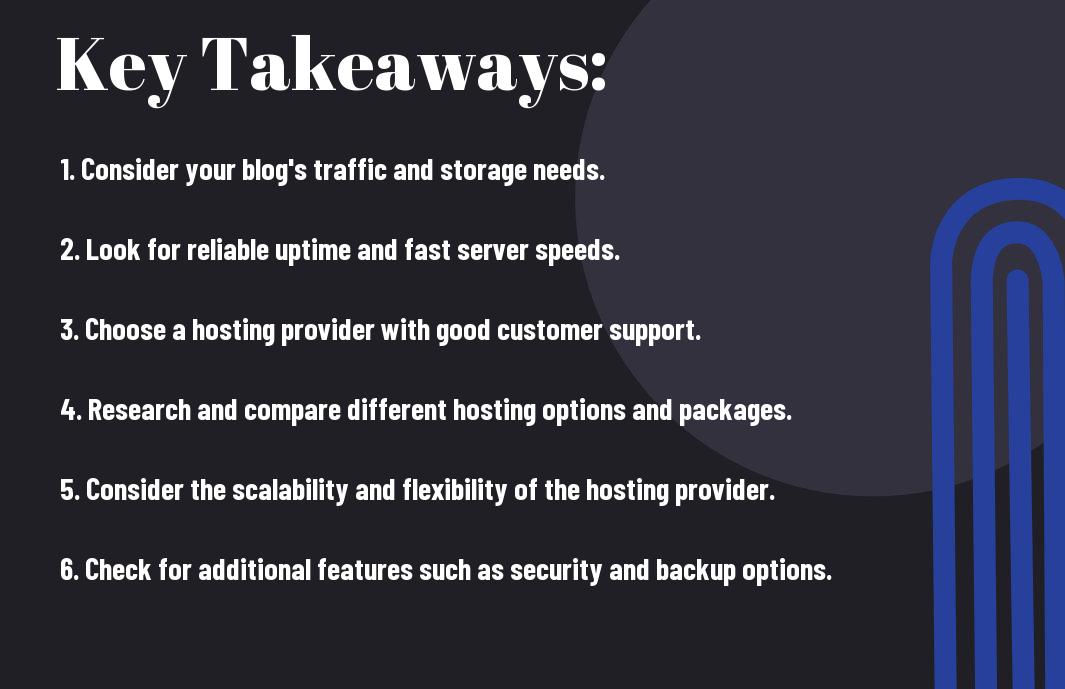Deciding on the right web hosting for your tech blog is a critical step in ensuring your online presence is reliable and efficient. With so many options available, it can be overwhelming to determine which provider is the best fit for your specific needs. It’s important to consider factors such as server reliability, performance, support, and security when making your decision. In this informative blog post, we’ll provide you with essential tips and guidelines to help you make an informed decision when selecting the best web hosting for your tech blog. We’ll walk you through what to look for and the potential pitfalls to avoid, so your blog can thrive in the online world.
Key Takeaways:
- Consider your blog’s specific needs: Take into account the amount of traffic, storage requirements, and any special features your tech blog may need.
- Check the reliability and uptime guarantee: Look for a web hosting service that offers a high uptime guarantee and reliable server performance to ensure your tech blog is always accessible to your audience.
- Look for scalable and secure options: Choose a web hosting provider that can accommodate your tech blog’s growth and also offers strong security measures to protect your content and data.
 Understanding Web Hosting Fundamentals
Understanding Web Hosting Fundamentals
Now, before you can choose the best web hosting for your tech blog, it’s important to have a solid understanding of the fundamentals of web hosting. Web hosting is essentially a service that allows individuals and organizations to make their website accessible via the World Wide Web. This service is provided by web hosting companies, which typically have servers that store the data and files needed to display a website.
Different Types of Web Hosting Services
Different Types of Web Hosting Services
When it comes to web hosting, there are several different types of services to choose from. The most common options include shared hosting, dedicated hosting, virtual private server (VPS) hosting, and cloud hosting. Each type of hosting service has its own set of advantages and disadvantages, and it’s important to consider your specific needs and budget when choosing the right option for your tech blog.
- Shared hosting: Most affordable option, but resources are shared with other websites on the same server
- Dedicated hosting: Offers the highest level of control and security, but comes with a higher price tag
- Virtual private server (VPS) hosting: Provides a balance between affordability and control, with a dedicated server space that is partitioned into multiple virtual environments
- Cloud hosting: Offers scalability and flexibility, as well as high uptime and reliability, but may be more complex to manage
- After considering these options, you can then narrow down your choices based on the specific needs and goals of your tech blog.
Key Technical Terminology
Key Technical Terminology
As you delve into the world of web hosting, you may come across a variety of technical terms that are important to understand. Some of the most crucial terminology includes bandwidth, disk space, uptime, server resources, and SSL certificates. Bandwidth refers to the amount of data that can be transferred between your website and the users who are accessing it, while disk space relates to the amount of storage space available for your website’s files and data. Uptime is a critical factor, representing the percentage of time that a server is operational and accessible. Server resources encompass the computing power, memory, and other hardware components allocated to your website, while SSL certificates are essential for ensuring secure data transmission over the internet.

Evaluating Your Hosting Needs
Unlike many other decisions you make for your tech blog, choosing the right web hosting provider requires a thoughtful and in-depth evaluation of your specific needs. It’s crucial to consider factors such as your blog’s traffic patterns, required resources, and scalability in order to make the best choice. To help you with this, you can refer to resources like Best Blog Hosting Services – Detailed Comparison (2023) for an in-depth analysis of the top hosting services available.
Analyzing Your Blog’s Traffic Patterns
When evaluating your hosting needs, analyzing your blog’s traffic patterns is a crucial first step. Understanding the amount of traffic your blog receives on a daily, weekly, and monthly basis will help you determine the level of hosting resources required to support your site effectively. Pay close attention to peak traffic times and any expected fluctuations, as this will help you choose a hosting plan that can accommodate these variations.
Assessing Required Resources and Scalability
Assessing the required resources and scalability of your hosting plan is essential for the smooth operation and growth of your tech blog. Consider the amount of storage, bandwidth, and processing power needed to handle your current traffic and content, and also anticipate future growth. You’ll want to choose a hosting provider that offers the flexibility to scale your resources as your blog’s needs evolve, without disrupting its performance or user experience.
Comparing Web Hosting Providers
Your quest for the best web hosting for your tech blog begins with comparing different providers. The following table breaks down key factors to consider when evaluating web hosting options:
| Factor | Description |
| Reputation and Reliability | Provider’s track record and uptime guarantees |
| Price and Value Proposition | Cost compared to features and performance |
| Customer Support and Service Quality | Quality of support and responsiveness to issues |
| Performance and Uptime Guarantees | Speed and reliability of the hosting infrastructure |
| Additional Features and Tools for Tech Blogs | Specific features catering to tech blogs |
Reputation and Reliability
When evaluating hosting providers, reputation and reliability are crucial. Look for providers with a strong reputation for reliability and uptime guarantees. You want a hosting provider that has a proven track record of keeping websites online and running smoothly, especially as a tech blogger where uptime is critical.
Price and Value Proposition
While cost is a significant factor, it’s essential to consider the value proposition of a hosting provider. Don’t just focus on the cheapest option, but also weigh the features, performance, and support you’ll receive for the price. Compare plans to see which offers the best balance of affordability and features tailored to your tech blog’s needs.
Customer Support and Service Quality
Quality customer support and service are vital when choosing a web hosting provider. Responsive and knowledgeable support can make a significant difference in resolving issues and ensuring your tech blog runs smoothly. Look for providers with a reputation for excellent customer service and technical support.
Performance and Uptime Guarantees
Performance and uptime guarantees are critical for the success of your tech blog. You want a hosting provider with fast and reliable infrastructure to ensure your website loads quickly and remains accessible to your readers. Pay attention to uptime guarantees and the provider’s ability to deliver on those promises.
Additional Features and Tools for Tech Blogs
Finally, look for additional features and tools specifically tailored to tech blogs. Consider features such as one-click installations for tech-related software, development tools, and security features designed to protect tech-related content. These can enhance your blogging experience and streamline your workflow.
Making the Decision
To make the best decision on web hosting for your tech blog, consider doing thorough research on the available options. In fact, you can find professional tips on how to make the right choice by reading the blog post How to Choose the Hosting for Your Blog: Expert Tips. This will give you a comprehensive overview of the factors to consider and what to look for in a hosting provider.
Reading Reviews and User Testimonials
One effective way to assess the reliability and performance of a web hosting service is by reading reviews and user testimonials. You can gain valuable insights into the experiences of other bloggers and tech professionals who have used the service. Look for red flags such as frequent downtime, poor customer support, or security issues. On the other hand, positive reviews can provide reassurance that the web hosting service is reliable and user-friendly.
Testing Services through Free Trials or Money-Back Guarantees
Many web hosting providers offer free trials or money-back guarantees, allowing you to test their services risk-free. Take advantage of these offers to get a hands-on experience with the hosting platform. This will give you a chance to assess the uptime, speed, and overall performance of the service. Testing a service before committing to it can help you avoid potential pitfalls and ensure that it meets your specific needs.
Conclusion: Choosing the Best Web Hosting for Your Tech Blog
Upon reflecting on the factors mentioned earlier, you should now have a clear understanding of what it takes to choose the best web hosting for your tech blog. From considering the specific needs of your blog, to analyzing the technical aspects of a hosting provider, there are several key considerations to keep in mind. Remember to prioritize factors such as uptime, customer support, security, and scalability, as these will directly impact the success and performance of your tech blog. By taking the time to thoroughly research and compare different hosting options, you can ensure that your blog is set up for success and able to handle the demands of a growing audience. Ultimately, the right web hosting provider will not only support your blog’s technical requirements, but also provide the reliability and flexibility needed to thrive in the competitive online space.
FAQ
Q: What factors should I consider when choosing the best web hosting for my tech blog?
A: When choosing a web hosting for your tech blog, consider factors such as reliability, speed, security, customer support, and scalability. You want a hosting provider that can handle your blog’s traffic and ensure its security.
Q: Should I choose a shared or dedicated hosting plan for my tech blog?
A: It depends on the size and expected traffic of your blog. Shared hosting is more cost-effective and suitable for small to medium-sized blogs, while dedicated hosting offers better performance and is ideal for larger blogs with higher traffic.
Q: What is the importance of uptime in web hosting for a tech blog?
A: Uptime is crucial for a tech blog as it directly affects the accessibility and visibility of your content. Choose a hosting provider with a high uptime guarantee to ensure that your blog is always available to your audience.
Q: How important is website speed for a tech blog, and how can web hosting affect it?
A: Website speed is critical for user experience and search engine rankings. A reliable web hosting provider with optimized servers and infrastructure can significantly improve the speed and performance of your tech blog.
Q: What security features should I look for when choosing web hosting for my tech blog?
A: Look for hosting providers that offer robust security features such as SSL certificates, DDoS protection, daily backups, and malware scanning. It’s important to safeguard your tech blog and your visitors’ data from potential threats.
CATEGORY:Uncategorized

